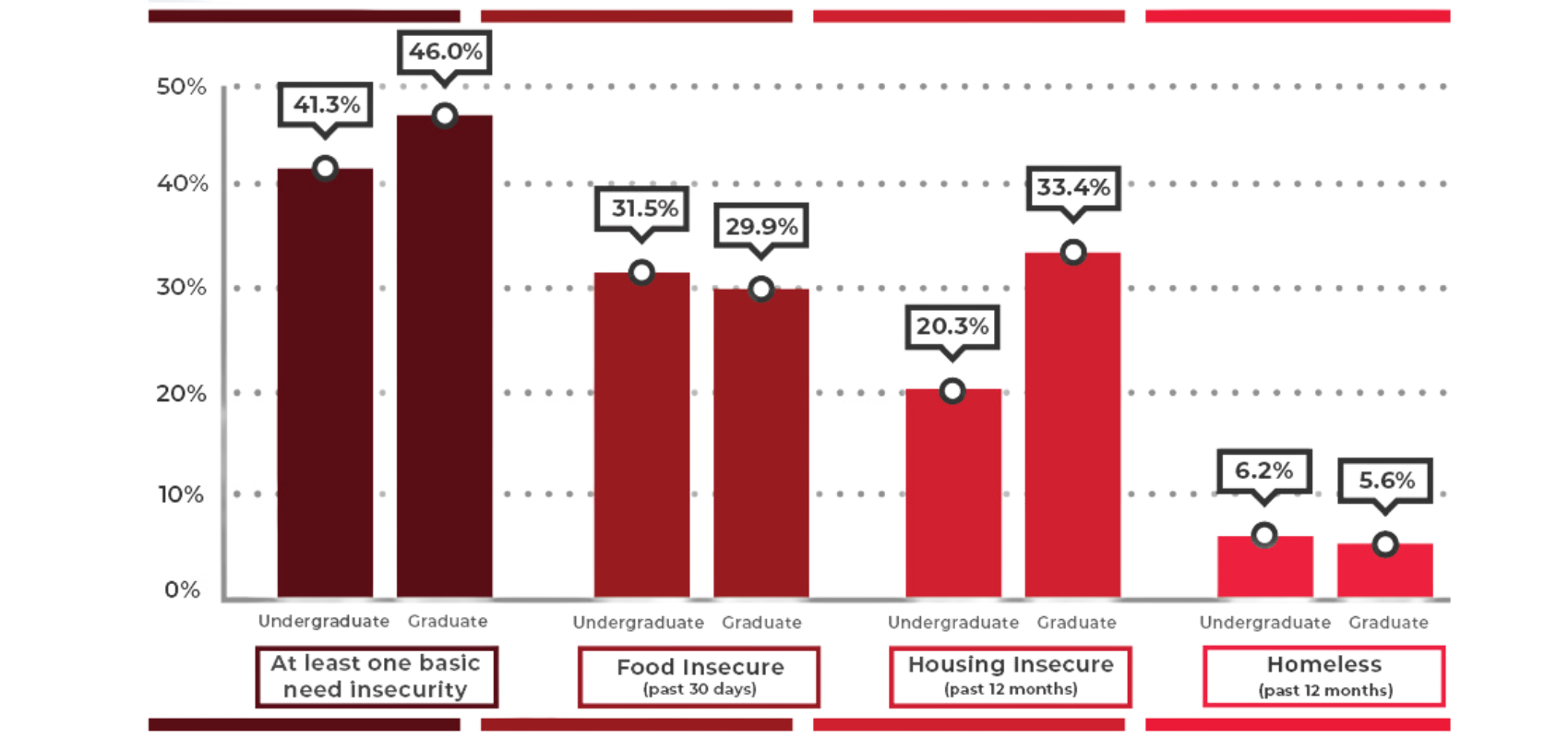
What are Basic Needs?
Basic needs include food and housing, childcare, mental health, financial resources and transportation, among others. Student basic needs security is critical for ensuring strong academic performance, persistence and graduation and overall student wellbeing.
Food insecurity, housing and homelessness are issues for many Rutgers-New Brunswick students. Research from 2019 indicates that 41.3% of undergraduates and 46% of graduate students report experiencing at least one basic need insecurity.
Reference: Cuite, C.L., Brescia, S.A., Willson, K., Weintraub, D., Walzer, M., Bates, L. (2020). Basic Needs Insecurity Among Rutgers-New Brunswick Students. https://go.rutgers.edu/BasicNeedsStudy
Rutgers Basic Needs Report 2020 Results

If you are interested in working with Rutgers basic needs insecurities survey data, please contact Cara Cuite, Assistant Professor, cuite@rutgers.edu.
How Can I Help?
Referrals
Issues of food and housing insecurity and homelessness can come with a significant deal of stigma. If someone does disclose that they are facing these challenges, you have several options to offer support. You can refer them directly to the Offices of the Dean of Students, complete one of the online nomination forms for emergency grants or housing insecurity or suggest one of the resources on basicneeds.rutgers.edu. We encourage you to also reach out to the Offices of the Dean of Students to share these concerns.
Referral Steps:
Thank them for sharing with you.
- “I’m really glad you told me what’s going on with you.”
- “I’m sure it was hard to share that struggle with me, thank you for trusting me.”
Acknowledge the challenge they are facing.
- “I can’t imagine how hard it is to focus in class when you are hungry.”
- “Not having stable housing is very stressful.”
Discuss options for support.
- “Did you know we have a food pantry in College Avenue Student Center, open to any student? It’s a resource here for students who might be struggling financially.”
- “The Dean of Students office may be able to help with an Emergency Aid Fund.”
Follow-up to see if they accessed the resource or need more help.
- “Were you able to connect with the Dean of Students office?”
- “Has your situation improved?”
Recognizing Warning Signs
There are several signs that could point to a student who is facing food and housing insecurity or homelessness. It might not be immediately obvious how serious the situation is because some students may be ashamed or embarrassed about it. Faculty and staff who are aware of the warning signals and the assistance available will be better able to identify and refer the student. The following list is not exhaustive, and not all students who exhibit these symptoms are experiencing housing or food insecurity—the symptoms may arise from other problems—but they frequently point to a problem with basic necessities.
- Inconsistent or decrease in classroom attendance
- Disconnected within the classroom
- Sleeping in campus libraries
- Consistently failing to complete assignments
- Avoidance of personal details
- Sleep deprivation or falling asleep in class
- Difficulty concentrating or focusing
- Reporting not doing the work because they haven’t purchased the textbook
- Increased level of distress
- Hopelessness
- Disrupted eating patterns
- Poor health and diet
- Poor personal hygiene
- Wearing the same clothes continually without them being cleaned
- Student discloses that they have been sleeping in their car, couch surfing, do not have anywhere to stay over the break period, have not been eating, do not have enough money to pay for food or bills, etc.
Request a Presentation
We would be happy to speak to your group if you would like us to visit your class, club, or department on campus or in the local area. We can customize presentations regarding our services and resources as well as strategies to assist students and the Rutgers community in accessing basic necessities. Please email us to discuss further.
Basic Needs Course Syllabi Statement
Faculty are encouraged to include the basic needs syllabi statement into their class syllabus:
“Basic needs include food and housing, childcare, mental health, financial resources and transportation, among others. Student basic needs security is critical for ensuring strong academic performance, persistence and graduation and overall student well-being. If you or someone you know are experiencing basic needs insecurity, please see the following resources at basicneeds.rutgers.edu.“
or
“Any student who has difficulty affording groceries or accessing sufficient food to eat every day, or who lacks a safe and stable place to live and believes this may affect their performance in the course, is urged to contact the Offices of the Dean of Students for support by emailing deaonofstudents@echo.rutgers.edu. The Rutgers Student Food Pantry is located on the lower level of the College Avenue Student Center (Room 115) and is open to all students.”
Additional text you may include:
- Many students face these challenges during college, and it is healthy to seek support.
- If you are comfortable, please talk to me about your experience.
